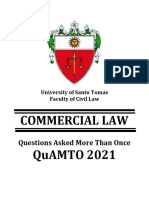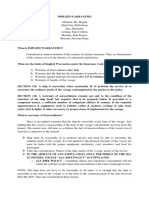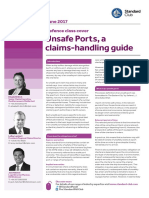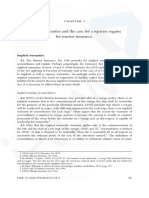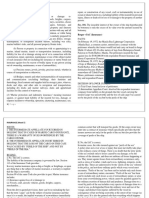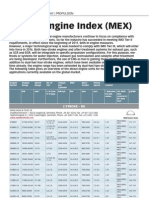123-126 Insurance Code
123-126 Insurance Code
Uploaded by
Rio AborkaCopyright:
Available Formats
123-126 Insurance Code
123-126 Insurance Code
Uploaded by
Rio AborkaOriginal Description:
Original Title
Copyright
Available Formats
Share this document
Did you find this document useful?
Is this content inappropriate?
Copyright:
Available Formats
123-126 Insurance Code
123-126 Insurance Code
Uploaded by
Rio AborkaCopyright:
Available Formats
VOYAGE AND DEVIATION SEC. 125.
Deviation is a departure
from the course of the voyage
insured, mentioned in the last two (2)
Section 123. When the voyage sections, or an unreasonable delay in
contemplated by a marine insurance pursuing the voyage or the
policy is described by the places of commencement of an entirely
beginning and ending, the voyage different voyage.
insured in one which conforms to the
course of sailing fixed by mercantile Kinds of Deviation
usage between those places. 1. Proper Deviation
2. Improper Deviation
Section 124. If the course of sailing is
not fixed by mercantile usage, the Marine Insurance is unique in that it has
voyage insured is that way between certain implied warranties. One of which
the places specified, which to a is provided in Section 125.
master of ordinary skill and
discretion, would mean the most Implied Warranty Against Improper
natural, direct and advantageous. Deviation – Unreasonable delay in
pursuing the voyage; or the
commencement of an entirely different
Route - the route that a vessel should voyage.
take is governed by Sections 123 and
124 of the Insurance Code.
How to determine the course of the
voyage? SEC. 126. A deviation is proper:
The course of the voyage shall be (a) When caused by circumstances
determined in the following order: over which neither the master nor the
owner of the ship has any control;
1. The course agreed upon by the
parties;
(b) When necessary to comply with a
2. If nothing was agreed upon, one warranty, or to avoid a peril, whether
which conforms to the course of sailing or not the peril is insured against;
fixed by mercantile usage;
(c) When made in good faith, and
3. If there is no mercantile usage, one upon reasonable grounds of belief in
which a master of ordinary skill and its necessity to avoid a peril; or
discretion would find to be the most
natural, direct and advantageous. (d) When made in good faith, for the
Note: Any departure from the course of purpose of saving human life or
voyage insured, mentioned in Sections relieving another vessel in distress.
123 and 124 of the Insurance Code is
called deviation.
Proper Deviation
Answer:
a. Due to circumstances outside the No, because no reasonable ground
control of the master or ship for avoiding a peril existed at the
owner; time of the deviation
b. Done to comply with warranty or
to avoid a peril whether or not the Example No. 2:
peril is insured against “X”, a master of the vessel, received
c. Made in good faith, and upon a an advice from PAG-ASA that a
reasonable ground of belief in its typhoon is approaching the course
necessity to avoid the peril; and pursued by the vessel. Relying
d. Made in good faith, for the thereon, the vessel changed course
purpose of saving human life or and was damaged thereafter. It
relieving another distressed turned out that PAG-ASA was
vessel. wrong. Can the insurer deny the
claim?
Improper deviation
Answer:
Every deviation not specified under No. There was a proper deviation in
Sec. 126 is improper (Sec. 127, this case because the master acted
Insurance Code). in good faith relying on the
information of PAG-ASA.
NOTE: In improper deviation, an
insurer is not liable for any loss
happening to the thing insured Example No. 3 (Bar 2005):
subsequent to an improper deviation
(Sec. 128, Insurance Code). On a clear weather, MV Sundo,
carrying insured cargo, left the port
Effect in case of loss or injury: Insurer is of Manila bound for Cebu. While at
still liable, as if there was no deviation. sea, the vessel encountered a
strong typhoon forcing the captain to
Example No. 1 (Bar 2011): steer the vessel to the nearest island
T, the captain of MV Don Alan, while where it stayed for 7 days. The
asleep in his cabin, dreamt of an vessel ran out of provisions for its
Intensity 8 earthquake along the passengers. Consequently, the
path of his ship. On waking up, he vessel proceeded to Leyte to
immediately ordered the ship to replenish its supplies.
return to port. True enough, the
earthquake and tsunami struck three a) Assuming that the cargo was
days later and his ship was saved. damaged because of such deviation,
Was the deviation proper? who between the insurance
company and the owner of the cargo to Manila. Empire Assurance
bears the loss? Explain. Company (Empire) is the insurer of
the lost cargoes loaded on board the
b) Under what circumstances can a vessel which were consigned to
vessel properly proceed to a port Debenhams Company. After it
other than its port of destination? indemnified Denbenhams, Empire
Explain. as subrogee filed an action for
damages against CSC.
Answer:
a) The insurance company should Assume that the vessel was
bear the loss. Since the deviation seaworthy. Before departing, the
was caused by a strong typhoon, it vesse was advised by the Japanese
was caused by circumstances Meteorological Center that it was
beyond the control of the captain, safe to travel to its destination. But
and also to avoid a peril whether or while at sea, the vessel received a
not insured against. Deviation is report of a typhoon moving within its
therefore proper. general path. To avoid the typhoon,
the vessel changed its course.
b) A vessel can properly proceed to However, it was still at the fringe of
a port other than its port of the typhoon when it was repeated hit
destination in the following cases: by huge waves, foundered and
eventually sank. The captain and the
1. When caused by
crew were saved except 3 who
circumstances over which neither
perished. Is CSC liable to Empire?
the master or the owner of the ship
Explain.
has any control;
2. When necessary to comply
with a warranty, or to avoid a peril,
whether or not the peril is insured Answer:
against; No, CSC is not liable to Empire. The
3. When made in good faith, doctrine of proper deviation is
and upon reasonable grounds of applicable in this case. The change
belief in the necessity to avoid peril; of course made by the vessel is
4. When made in good faith for proper as it was to avoid the typhoon
the purpose of saving human life or and the huge waves which are
relieving another vessel in distress. considered perils of the sea. (BAR
2008)
Example No. 4 (Bar 2008):
On October 30, 2007, M/V Pacific, a
Philippine registered vessel owned
by Cebu Shipping Company (CSC),
sank on her voyage from Hong Kong
You might also like
- Commercial Law Quamto 2021: Questions Asked More Than OnceDocument145 pagesCommercial Law Quamto 2021: Questions Asked More Than OnceJustitia Et Prudentia89% (18)
- Insurance Notes: Marine InsuranceDocument15 pagesInsurance Notes: Marine InsuranceJinuro San100% (1)
- Offshore and Harbour Cranes PDFDocument20 pagesOffshore and Harbour Cranes PDFHemanth Kumar Sarosh KiranNo ratings yet
- Coastguard Boating Education Marine Radio Operator Manual v2.05Document65 pagesCoastguard Boating Education Marine Radio Operator Manual v2.05recutuNo ratings yet
- BAR Q's INSURANCEDocument29 pagesBAR Q's INSURANCETenshi OideNo ratings yet
- Insurance FINALSDocument20 pagesInsurance FINALSWild BuTandihngNo ratings yet
- Ramiro & PM ReyesDocument6 pagesRamiro & PM ReyesAnonymous fnlSh4KHIgNo ratings yet
- Rule Sec 117) - Exceptions: Take Into Consideration These FactorsDocument3 pagesRule Sec 117) - Exceptions: Take Into Consideration These FactorsharmaeinNo ratings yet
- Any Statement You Made That You Make in Regard To The InsuranceDocument5 pagesAny Statement You Made That You Make in Regard To The InsurancechriselskiNo ratings yet
- Roque vs. Intermediate Appellate CourtDocument12 pagesRoque vs. Intermediate Appellate CourtkwonpenguinNo ratings yet
- Owner/Debtor: Marine InsuranceDocument5 pagesOwner/Debtor: Marine InsuranceHazel Martinii PanganibanNo ratings yet
- Subject: Transportation (Finals Tips) Professor: Atty. Ampil By: Butch Ramiro and Pierre Martin Reyes C2013Document6 pagesSubject: Transportation (Finals Tips) Professor: Atty. Ampil By: Butch Ramiro and Pierre Martin Reyes C2013Mae SampangNo ratings yet
- What Is Marine Adventure?: Voyage Policy Open PolicyDocument13 pagesWhat Is Marine Adventure?: Voyage Policy Open PolicyCindy-chan DelfinNo ratings yet
- Go Tiaoco V Union Insurance - ATIENZA-F (D2017Document1 pageGo Tiaoco V Union Insurance - ATIENZA-F (D2017KCCNo ratings yet
- Rule Sec 117) - Take Into Consideration These FactorsDocument3 pagesRule Sec 117) - Take Into Consideration These FactorsHarmaein KuaNo ratings yet
- Virgilio - Insurance - Part ADocument17 pagesVirgilio - Insurance - Part AMark Joseph M. VirgilioNo ratings yet
- 101 La Razon Social Go Tiaoco Y Hermanos V Union Insurance Society of Canton Ltd.Document1 page101 La Razon Social Go Tiaoco Y Hermanos V Union Insurance Society of Canton Ltd.thornapple25No ratings yet
- Marine InsuranceDocument11 pagesMarine InsuranceshalwNo ratings yet
- 137 Roque V IACDocument3 pages137 Roque V IACJovelan V. EscañoNo ratings yet
- Virgilio Insurance Part ADocument18 pagesVirgilio Insurance Part AMark Joseph M. VirgilioNo ratings yet
- Priacy Insurance Risk English PDFDocument7 pagesPriacy Insurance Risk English PDFFatihah YusofNo ratings yet
- Marine Insurance ReferenceDocument8 pagesMarine Insurance Referencelaila lasamNo ratings yet
- Secs. 122-128 Insurance CodeDocument16 pagesSecs. 122-128 Insurance CodeangelicaNo ratings yet
- DigestDocument2 pagesDigestPrincess Kimberly Ubay-ubayNo ratings yet
- Roque vs. Intermediate Appellate Court: FactsDocument6 pagesRoque vs. Intermediate Appellate Court: FactsAliyah SandersNo ratings yet
- Roque vs. Intermediate Appellate Court: FactsDocument5 pagesRoque vs. Intermediate Appellate Court: FactsAliyah SandersNo ratings yet
- Roque vs. Intermediate Appellate Court: FactsDocument6 pagesRoque vs. Intermediate Appellate Court: FactsAliyah SandersNo ratings yet
- Roque vs. Intermediate Appellate Court: FactsDocument6 pagesRoque vs. Intermediate Appellate Court: FactsAliyah SandersNo ratings yet
- Standard PI Club Unsafe Ports A Claims Handling GuideDocument4 pagesStandard PI Club Unsafe Ports A Claims Handling GuideMullur SrinivasanNo ratings yet
- Marine Insurance: Adithya V Arka B Shyam K Mahesh PDocument40 pagesMarine Insurance: Adithya V Arka B Shyam K Mahesh Ppalak24070% (1)
- Law of Insurance Warranties, The CHAPTER 4 Implied Warranties and The Case For A Separate Regime FoDocument16 pagesLaw of Insurance Warranties, The CHAPTER 4 Implied Warranties and The Case For A Separate Regime FoRamesh SNo ratings yet
- Insurance - March 27Document14 pagesInsurance - March 27graceNo ratings yet
- A Urrutia & Co., Plantation CO., Garza,: First DivisionDocument33 pagesA Urrutia & Co., Plantation CO., Garza,: First DivisionAdrian KitNo ratings yet
- Finals Reviewer TranspoDocument9 pagesFinals Reviewer TranspoAinah BaratamanNo ratings yet
- Transpo Digests 2016Document33 pagesTranspo Digests 2016André Jan Lee Cardeño100% (1)
- Provisions Insurance Secs 107-166Document7 pagesProvisions Insurance Secs 107-166Darlene De GuzmanNo ratings yet
- The Petitioners Whereby The Former Would Load and Carry On Board Its Barge Mable 10 About 422.18Document6 pagesThe Petitioners Whereby The Former Would Load and Carry On Board Its Barge Mable 10 About 422.18Kimberly RamosNo ratings yet
- Marine InsuranceDocument1 pageMarine InsurancePeanutButter 'n JellyNo ratings yet
- Finals-Insurance Week 5Document19 pagesFinals-Insurance Week 5Ryan ChristianNo ratings yet
- Chapter 1 The Rights and Duties of Shipowners and CharterersDocument28 pagesChapter 1 The Rights and Duties of Shipowners and CharterersDavid Montin50% (2)
- Central Shipping V Insurance Company of North America (Case Digest)Document2 pagesCentral Shipping V Insurance Company of North America (Case Digest)Jubelle AngeliNo ratings yet
- Transpo Cases Chapters 17 18Document33 pagesTranspo Cases Chapters 17 18Anonymous b0dXqaSNo ratings yet
- Roque v. Intermediate Appellate CourtDocument5 pagesRoque v. Intermediate Appellate CourtBea DiloyNo ratings yet
- Syllabus For The Law On Transportation and Public UtilitiesDocument12 pagesSyllabus For The Law On Transportation and Public UtilitiesLorelieNo ratings yet
- Transpo Quiz 2 Finals With AnswersDocument9 pagesTranspo Quiz 2 Finals With AnswersAbigael SeverinoNo ratings yet
- Central Shipping V Insurance Company of North AmericaDocument4 pagesCentral Shipping V Insurance Company of North AmericaJubelle AngeliNo ratings yet
- Inch MareeDocument8 pagesInch MareeshilparabNo ratings yet
- IML Assignment 1Document9 pagesIML Assignment 1HanifNo ratings yet
- SEC. 129. A Loss May Be Either Total or Partial.: in Marine InsuranceDocument18 pagesSEC. 129. A Loss May Be Either Total or Partial.: in Marine InsuranceMark Joseph M. VirgilioNo ratings yet
- Marine Insurance NotesDocument7 pagesMarine Insurance NotesJan Miguel ManuelNo ratings yet
- File No 14 Port of RefugeDocument9 pagesFile No 14 Port of Refugebittu692No ratings yet
- Finals ReviewerDocument3 pagesFinals ReviewerTiffany HallNo ratings yet
- Marine InsuranceDocument8 pagesMarine InsuranceJoachim SaldanhaNo ratings yet
- Concept of General Average in Maritime Commerce: TopicsDocument22 pagesConcept of General Average in Maritime Commerce: TopicsJah JoseNo ratings yet
- Maritime Law: Provident Insurance Corp, G.R. No. 154305, Dec. 9, 2004)Document7 pagesMaritime Law: Provident Insurance Corp, G.R. No. 154305, Dec. 9, 2004)Greta Girl100% (1)
- 135) La Razon Social Go Tiaoco V Union InsuranceDocument2 pages135) La Razon Social Go Tiaoco V Union InsuranceAlfonso Miguel LopezNo ratings yet
- 134 Roque Vs IACDocument1 page134 Roque Vs IACKirsten Denise B. Habawel-VegaNo ratings yet
- Sec. 99. Marine Insurance IncludesDocument10 pagesSec. 99. Marine Insurance IncludesFredrick FernandezNo ratings yet
- Rough Weather Seamanship for Sail and Power: Design, Gear, and Tactics for Coastal and Offshore WatersFrom EverandRough Weather Seamanship for Sail and Power: Design, Gear, and Tactics for Coastal and Offshore WatersRating: 3 out of 5 stars3/5 (3)
- International Regulations for Preventing Collisions at SeaFrom EverandInternational Regulations for Preventing Collisions at SeaNo ratings yet
- Civil Law Review 2 - SALESDocument627 pagesCivil Law Review 2 - SALESRio AborkaNo ratings yet
- Bar Legal FormsDocument16 pagesBar Legal FormsRio AborkaNo ratings yet
- Commercial Law Notes - Jurist Lecture (Reduced)Document17 pagesCommercial Law Notes - Jurist Lecture (Reduced)Rio AborkaNo ratings yet
- Political Law Jurist Lecture NotesDocument10 pagesPolitical Law Jurist Lecture NotesRio AborkaNo ratings yet
- Civil Law Jurist Lecture Notes ReducedDocument21 pagesCivil Law Jurist Lecture Notes ReducedRio AborkaNo ratings yet
- Complaint Affidavit For RapeDocument7 pagesComplaint Affidavit For RapeRio AborkaNo ratings yet
- 01 Case Digest Statement Investment House, Inc Vs CADocument3 pages01 Case Digest Statement Investment House, Inc Vs CARio AborkaNo ratings yet
- Finals - PWD Presentation 1Document24 pagesFinals - PWD Presentation 1Rio AborkaNo ratings yet
- LASCO Vs UNRFNREDocument1 pageLASCO Vs UNRFNRERio AborkaNo ratings yet
- Cases 1-20Document154 pagesCases 1-20Rio AborkaNo ratings yet
- Marine Engine Index (MEX)Document14 pagesMarine Engine Index (MEX)marine2013100% (1)
- Fluvial Landfrom (Final)Document29 pagesFluvial Landfrom (Final)Prakash Singh100% (1)
- CarouselDocument3 pagesCarouselZaenal ArifinNo ratings yet
- Sem2 - Ship ConstructionDocument65 pagesSem2 - Ship ConstructionJaiprakash Jain100% (5)
- AIMPA-October Issue IIIDocument34 pagesAIMPA-October Issue IIICapt Gajanan KaranjikarNo ratings yet
- Marine TechnologyDocument2 pagesMarine Technologymohammed.yunusNo ratings yet
- Accommodation Ladder NewDocument9 pagesAccommodation Ladder NewBrian Voyd Rebito100% (1)
- Reglas Alternativas Pirates of Spanish MainDocument26 pagesReglas Alternativas Pirates of Spanish MainjvilladomiNo ratings yet
- Keuning 2008 PDFDocument9 pagesKeuning 2008 PDFmusebladeNo ratings yet
- Harbour 4501Document12 pagesHarbour 4501AUNG NAINGNo ratings yet
- Customs and CourtesiesDocument23 pagesCustoms and CourtesiesMelodia Turqueza GandezaNo ratings yet
- Meeting 1 Bahasa Inggris Maritim ANT 2Document9 pagesMeeting 1 Bahasa Inggris Maritim ANT 2RachmatullahNo ratings yet
- Dual Activity Drill FloorDocument8 pagesDual Activity Drill FloorWILLIANS HERNANDEZNo ratings yet
- Stability Approval Questionnaire: Stability - Unit@mcga - Gov.ukDocument4 pagesStability Approval Questionnaire: Stability - Unit@mcga - Gov.ukNAUTASNo ratings yet
- IMO Colregs ROR Simplified - Edition 0.1Document31 pagesIMO Colregs ROR Simplified - Edition 0.1himanjanaNo ratings yet
- Underwater Noise Source Level of Ships-DWDocument8 pagesUnderwater Noise Source Level of Ships-DWJiban podder100% (1)
- 2.abstract of The ThesisDocument49 pages2.abstract of The ThesisyugeshperiNo ratings yet
- IML Assignment 1Document9 pagesIML Assignment 1HanifNo ratings yet
- Training in HSLDocument18 pagesTraining in HSLG Sri SoumyaNo ratings yet
- STCW - MarkedDocument8 pagesSTCW - MarkedAmit KunduNo ratings yet
- Explorers PowerpointDocument23 pagesExplorers Powerpointapi-266088722No ratings yet
- Mtu Sales ProgramDocument36 pagesMtu Sales ProgrammajdirossrossNo ratings yet
- Centaurus Charter Profile 2023Document9 pagesCentaurus Charter Profile 2023indienkhanNo ratings yet
- Final Intact Stability BooDocument986 pagesFinal Intact Stability Boopothirajkalyan100% (1)
- Rescue at Waters Edge DigitalDocument7 pagesRescue at Waters Edge DigitalAllison WaltonNo ratings yet
- SAILOR 6000 RDO TLX User Manual 98-132519-A PDFDocument60 pagesSAILOR 6000 RDO TLX User Manual 98-132519-A PDFGeta Enache100% (1)
- Idbf KG Ebdes F03809 - 1Document9 pagesIdbf KG Ebdes F03809 - 1Kumar sssssNo ratings yet
- Minggu 11Document19 pagesMinggu 11ryo asg5No ratings yet
